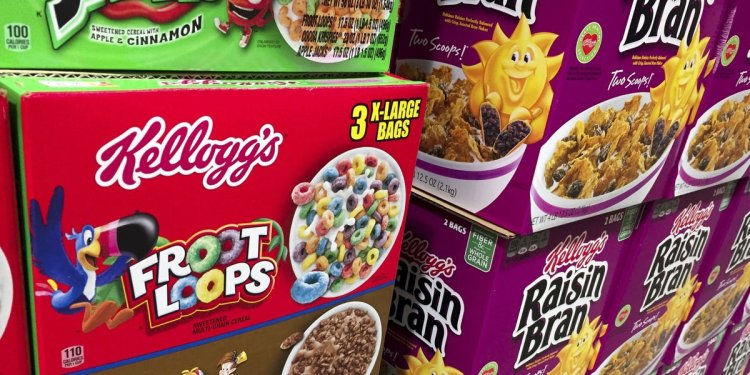Kellogg's faces a backlash after encouraging cash-strapped shoppers to eat cereal for dinner: 'What the hell kind of dystopian hellscape is this?'
Social-media users say cereal is no longer cheap anyway, and likened Pilnick's remarks to the infamous "let them eat cake" remark.

Saul Loeb/AFP via Getty Images
- Kellogg's is advertising cereal for dinner as an alternative for people struggling with food prices.
- But people aren't impressed with WK Kellogg CEO Gary Pilnick's comments.
- Social-media users say cereal is no longer cheap anyway, and likened Pilnick's remarks to "let them eat cake."
Kellogg's is advertising cereal as an affordable dinner for people struggling with the rising cost of food — but some consumers aren't happy with the cereal maker's approach.
WK Kellogg CEO Gary Pilnick told CNN last week that the messaging was "landing really well" with customers.
"Cereal for dinner is something that is probably more on trend now, and we would expect to continue as that consumer is under pressure," he said.
But the reaction to his comments on social media suggests otherwise.
"What the hell kind of dystopian hellscape is this?" one user wrote on a TikTok with almost 150,000 views. "Give the peasants cereal for dinner!" another commented.
Some people have likened Pilnick's remarks to the infamous "let them eat cake" comment, often wrongly attributed to Marie Antoinette during the French Revolution.
Social-media users have complained that cereal is no longer cheap, anyway. Some said that if people had to eat cereal for dinner to save money, they probably wouldn't be able to afford name brands like Kellogg's.
"Advertising to hungry people that cereal might be good for dinner is not 'meeting people where they are,'" author Marianne Williamson wrote on X. "It's exploiting the hungry for financial gain."
People have also questioned the health benefits of eating cereal for an extra meal, given that it can contain high levels of sugar. An ad uploaded to Kellogg's YouTube channel in August 2022 shows a family with young children choosing cereal for their evening meal.
Both the American Academy of Pediatrics and the American Heart Association have recommended that children over the age of two don't consume more than 25 grams of added sugars — those not naturally included in fruit, vegetables, and milk — per day. A recommended portion size of Froot Loops — one-and-a-half cups — contains 12 grams of added sugars.
Cereal prices shot up 13% in 2022
Grocery prices soared during the pandemic as supply-chain chaos pushed up costs for producers. In 2022, grocery prices shot up by 11.8%.
The average price of breakfast cereal in the US went up 6% in 2021 and 13% in 2022 but just 0.3% in 2023 as inflation cooled, according to unadjusted consumer price index data from the Bureau of Labor Statistics. In December, breakfast cereal comprised around 1.5% of the average American's grocery spending.
"The cereal category has always been quite affordable, and it tends to be a great destination when consumers are under pressure," Pilnick told CNN.
"If you think about the cost of cereal for a family versus what they might otherwise do, that's going to be much more affordable." A bowl of cereal with milk and fresh fruit costs less than $1, he said.
In a press release promoting the meal in 2022, Sadie Garcia, Kellogg All Family Cereal's director of brand marketing, said that having cereal for dinner was a "low-prep, low-mess and low-price meal option." Pilnick told CNN last week that more than a quarter of cereal consumption is outside breakfast.
Kellogg's cereal brands include Frosted Flakes, Fruit Loops, Corn Flakes, and Raisin Bran. Outside of cereal, the company also sells Pop-Tarts, Pringles, and Graham Crackers.
Cereal is among the products being targeted by some brands for shrinkflation — where producers discreetly make the weight of their products smaller instead of putting up prices.
What's Your Reaction?




















